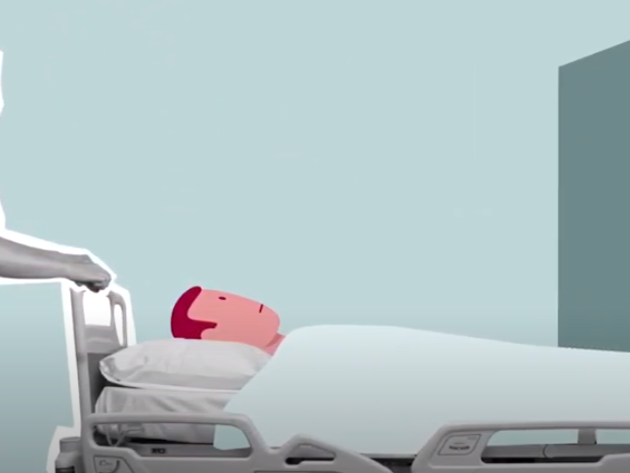Surgery for testicular cancer
Surgery for testicular cancer aims to remove the testicle, This procedure, also known as an orchidectomy, will be done through the groin, through which your surgeon brings up the testicle for removal. An orchidectomy is a simple procedure that takes approximately 30 minutes. You will be able to go home relatively soon after the surgery. You will have the option to have a prosthetic placed immediately without an additional incision.
More information
An orchidectomy - what to expect?
Your urologist will remove your testicle through an incision above the pelvic bone. If your cancer has spread through the body, you will need to see a medical oncologist for chemotherapy and/or radiation therapy after your surgery.
We will use CT scans to monitor the results of this additional treatment. If we find cancer cells in your body, you will need to come in for additional surgery to remove this tissue. Depending on the amount of tissue that will need to be removed and its exact location, you may qualify for robotic (keyhole) surgery at the NKI. You will be referred to an urologist. If your cancer has spread to the lungs, you will be referred to a thoracic surgeon.
Effectiveness
Testicular cancer has a high success rate, especially when the cancer is still in the early stages. The survival rates are close to 100%. These numbers decrease as the cancer has spread throughout the body, although your prognosis will still be more than decent. Metastatic testicular cancer has an uniquely high survival rate.
Preoperative screening
Before your surgery, you will be invited to meet with your anesthesiologist at the outpatient clinic for a consultation and a brief examination to assess your overall shape and any potential particularities we will need to keep in mind. The consultation assistant will measure your heart rate and blood pressure and will inquire about your height and weight. If needed, we can take those measurements during the appointment.
This preoperative screening will take approximately 20 minutes and will form the base of your anesthesia. Your anesthesiologist will listen to your lungs and heart and inspect your mouth and throat in preparation of the breathing tube that will be placed during surgery. Your anesthesiologist will also ask you:
Before your surgery, you will be invited to meet with your anesthesiologist at the outpatient clinic for a consultation and a brief examination to assess your overall shape and any potential particularities we will need to keep in mind. The consultation assistant will measure your heart rate and blood pressure and will inquire about your height and weight. If needed, we can take those measurements during the appointment.
This preoperative screening will take approximately 20 minutes and will form the base of your anesthesia. Your anesthesiologist will listen to your lungs and heart and inspect your mouth and throat in preparation of the breathing tube that will be placed during surgery. Your anesthesiologist will also ask you:
- whether you have been under anesthesia before
- whether you have any other conditions
- whether you have taken cancer medicine before
- whether you have had radiation treatment before
- whether you have any allergies
- whether you smoke
- whether you drink alcohol
- what kind of medication you take
Please inform your anesthesiologist of the type of medication and dose you take, and how often you take it. Your physician may want to run more tests before your surgery, such as: electrocardiogram (ECG), lung x-rays, a lung function test, or a blood test.
General or local anesthesia
Before your surgery you will be given general anesthesia, local anesthesia, or a combination of the two. General anesthesia means that you will be completely unconscious during surgery, whereas local anesthesia means that a part of your body will be numb and motionless.
General anesthesia
General anesthesia completely sedates your body. You will be given a cocktail of sleeping medicine, pain killers, and sometimes a muscle relaxant through IV. You will be unconscious within 30 seconds. You will be ventilated during the entire process.
If you are having major surgery, we will place a respiration tube in your throat. For smaller surgeries, a small cap in the back of the throat will suffice. We will closely monitor your heart rate, blood pressure, breathing, and temperature through our monitoring devices.
Local anesthesia
If you are given local anesthesia, you will be conscious during your surgery. Local anesthetics are usually administered through an epidural in the spine, and will temporarily numb all body parts underneath. We may place a tube to give you IV pain medication during and after surgery.
Your anesthesiologist will keep a close eye on your blood pressure, heart rate, breathing, and temperature in order to adapt the anesthesia if needed.
Most people undergoing major surgery will be given a mixture of general and local anesthetics.
Side-effects and complications
The surgery has little to no complications other than the loss of a testicle.
If any additional abnormalities will need to be removed after chemotherapy, the complications will depend on the amount and the location of these abnormalities. Your urologist and surgeon will discuss your situation with you.
After your surgery
An orchidectomy is a simple procedure that takes approximately 30 minutes. You will be able to go home soon after the surgery. We will invite you to come in for follow-up screenings over the coming 5 to 10 years. These screenings will be handled by medical oncologists.
Recovery
Recovery time and hospital stay for a procedure after chemotherapy will depend on the type of treatment.
If you received robotic surgery, you will be able to go home in approximately a week or two. Open surgery will require you to stay longer: 5 to 6 days on average. You will be invited for regular check-ups by a medical oncologist.
Fertility preservation
Because surgery for testicular cancer may harm your fertility, we offer you the opportunity for fertility preservation.
 nl
nl
